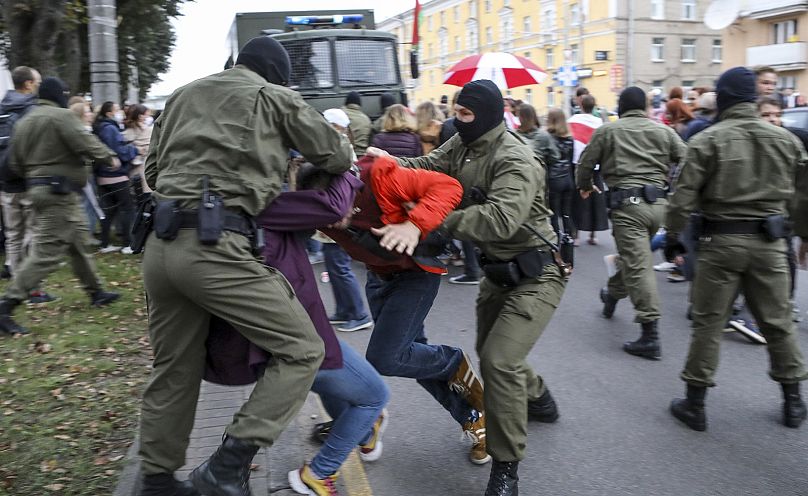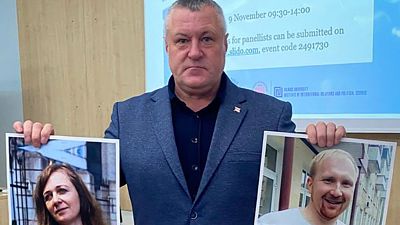Speaking to Euronews Next, Belarus' opposition leader reflected on human rights abuses in her homeland and technology's role in democracy.
"Belarus is now a huge jail where millions of people are hostages and the regime is trying to control people through constant fear and detention," says Sviatlana Tsikanouskaya.
The exiled opposition leader, who ran against the president of Belarus, Alexander Lukashenko, in a 2020 election that international observers called "neither free nor fair," spoke to Euronews Next on the fringes of Web Summit in Lisbon.
The objective of her appearance at one of the world’s biggest technology events was a clear one: to pull focus on the three-year-long struggle to democratise her homeland.
"Belarus looks like some very far off, long-time ago issue, and our task as democratic forces is to explain the situation in Belarus now; that the conflict is continuing, a humanitarian disaster is still taking place," she said.
Every day, 20 people, she notes, are arrested and detained in an ongoing crackdown by regime authorities that began after millions took to the streets in protest in the wake of what many believe was a rigged presidential election in August 2020.
According to the Minsk-based Viasna Human Rights Centre, 1,444 Belarusians are currently being held as political prisoners as of November 21. The total number of detainees is estimated by human rights groups to be much higher.
Amongst those jailed is Tsikhanouskaya’s husband, activist and YouTuber vlogger Siarhei Tsikhanouski. As Lukashenko’s original opponent, he was summarily arrested on the campaign trail.
The state of his welfare is unclear, but prison conditions in the country are widely considered to be intolerable. Since her own conviction in absentia in March - for which she was sentenced to 15 years by a court in Minsk for treason, amongst other charges - Tsikhanouskaya has had no definitive confirmation as to whether her spouse is still alive.
Deaths in custody of political prisoners are not uncommon in Belarus. In July, another political prisoner, artist Ales Pushkin, died suddenly in unknown circumstances.
Following her husband’s incarceration, former teacher Tsikhanouskaya assumed the role of presidential candidate despite not harbouring any desire for a political career of her own.
In time, she has become a lightning rod for pro-democracy activists both inside the country and for those, like her, forced into exile.
"The people themselves are getting exhausted of the situation. But I think that the feeling of responsibility and the feeling of pain transforms into energy to continue," she told Euronews Next.
'Our common fight'
Overshadowed, Belarus’ plight has been largely forgotten by Western democracies whose attention has turned to sending military aid to Ukraine and now, the de-escalation of renewed fighting in the Middle East.
However, the fates of both Ukraine and Belarus are more intertwined than ever, Tsikhanouskaya believes, thanks to Lukashenko’s regime.
Dubbed "Europe’s last dictator," he has ruled Belarus since 1994 when the presidency was first established in the wake of the collapse of the Soviet Union in 1991.
His 30-year grip on power has been further cemented with the support of his close ally, Russian president Vladimir Putin.
In return for this support, Lukashenko backed the invasion of neighbouring Ukraine in late February 2022, allowing Belarusian territory along its border to be used as a staging point for Russian forces.
"The last argument of Lukashenko in recent years was, 'look, maybe I am a dictator, but at least there is peace in Belarus'. And then he brought war to our gates," Tsikhanouskaya told Euronews Next.
Nearly two years on from the initial invasion, Belarus continues to host Russian troops, warplanes, and missiles.
"Dictatorship is like cancer. Until you cut it to the last cell, it will spread and spread," she said.
"Maybe the imperialist ambitions of Russia will spread further and they [the Russians] would like to return to all the lands that were one-time occupied. So, I don't think it's the Ukrainians' war or a Belarusian fight - it is our common fight.
"We have to understand this to defeat this dictatorship".
Despite the regime’s threats of the death penalty and lengthy prison stays in retaliation, anti-Russia guerillas have sprung up around the country, committing amongst other things acts of sabotage on Belarus’ railway network to severely hamper the free movement of troops and military hardware.
"The victory of Ukraine will be a new window of opportunity for the Belarusian people. But we have to be prepared for this and not just wait until the Ukrainians win, but to contribute to this victory as much as we can," Tsikhanouskaya said.
"The Ukrainian people understand that the Belarusian regime and the Belarusian people are two different things and that we are actually facing and fighting the same enemy - the imperialist ambitions of Russia," she added.
But what’s at stake for Belarus if Ukrainian forces fail to hold up as a bulwark against Russian aggression?
"I was asked a question by one person [at Web Summit], 'what if Russia prevails?' Or rather 'what if a deal would leave Russia in Lugansk, Donetsk. Crimea was given in 2014. So, maybe it [a deal] is a solution?' And I answered, 'okay, but the question is who will be next?'"
Technology as 'a beacon of democracy'
Among those earnestly resisting the current pro-Russia regime are Belarus’ tech workers.
Before the 2020 election, Belarus had cultivated a burgeoning IT sector but many of its specialists and software engineers chose to join the ranks of those protesting on the streets of Minsk and other big cities.
However, in the years that have followed, their fortunes have shifted under the repressive Lukashenko regime, precipitating a brain drain with thousands forced to flee. Many have taken refuge in neighbouring countries, benefiting from schemes like Poland’s Business Harbour Visa, as reported by Euronews Next.
"Since 2020, thousands of people who engaged in the IT sphere had to flee Belarus. And these are the people who want to promote everything Belarusian, who may be producing some products that highlight Belarus - they're proud to be Belarus IT specialists," she said.
Those who have no option but to remain behind in Belarus are either forced to work in Russia’s IT sector or continue their careers at home without the hope of prospering, Tsikhanouskaya says. She hopes this changes in the future.
"We have very disciplined, well-educated, very hardworking people, but we have poor management of our country under this dictatorship. There is no possibility for people to develop these skills," she added.
"I hope that those people who are for Belarus - for democratic Belarus - who are now in exile, and even those left in the country, will develop this sector proudly in the future. Being in exile, they will already see how to attract new investments to Belarus".
The technology sector, she says, can be a "beacon of democracy".
She points to the example of Belarusian engineers who created the "New Belarus" platform, a one-stop smartphone app that provides e-government services to Belarusians inside and outside the country, allowing them to access online legal and medical services, as well as electronic IDs and even passports.
Many companies also continue to financially support political prisoners, for instance, or initiatives to allow Belarusian culture to flourish.
"They have to develop their business, but simultaneously they are supporting those who sacrificed their time, and their lives to this fight and want to be part of this fight," said Tsikhanouskaya.





